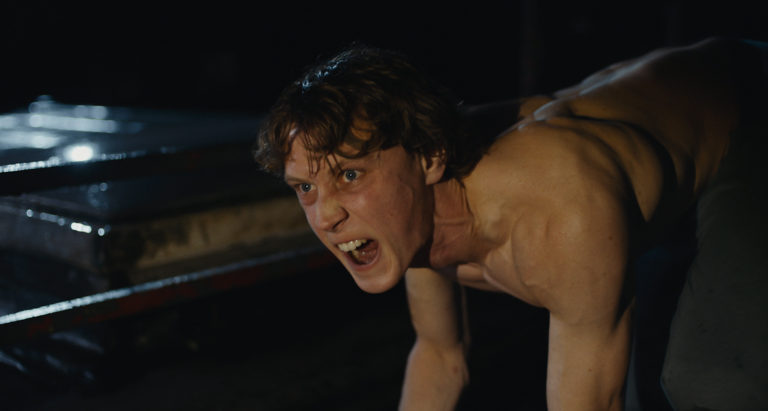Wolf (2021 | USA | 108 minutes | Nathalie Biancheri)
The next progression in the unintentional trilogy of films that have a single word title of an animal, with Pig and Lamb preceding it, Wolf is an uncomfortably strange look at a young man who thinks he is the four-legged predator.
It stars an outstanding George MacKay as Jacob who, after being sent by his parents to an institution meant to reform him, is struggling to find out what he wants to be. Experiencing what the story calls “species identity disorder,” Jacob feels a strong urge to live his life as a wolf. He roams the halls of the facility at night, howling at the moon when he finds his way outside. Whether or not you buy into this condition, the film fully does. It plays it all with a straight face while still finding some moments of dark humor while Jacob remains confined at the facility.
While there, he finds himself amongst other young people experiencing similar challenges. One believes she is a bird, another a dog, and yet another a squirrel. The film briefly mentions that many of these young people have been impacted by trauma, raising the question about whether this disorder is a coping mechanism for those who are trying to find some way to heal. Explanations are kept far in the background, making it clear that healing is likely impossible.
The foremost reason such recovery is out of grasp is that we soon discover that they have been sent to the wrong place for anything resembling compassion or kindness. A menacing man known as The Zookeeper (yes, that it is really what he is referred to as) presides over the institution and takes extreme measures in an attempt to “cure” them. Played with a frightening force by Paddy Considine, he is the closest Wolf has to an antagonist as he begins to steadily abuse and even outright torture the children that are under his care.
The result is a film that is more interesting in concept than it is wholly successful in execution. Writer-director Nathalie Biancheri does an outstanding job of building up tension in the claustrophobia of the facility. The sense of persistent dread is an oppressive force in the walls of the building, with every frame leaving you with a deep sense of connection to the characters and their predicaments. The problem is the story with limited substance is further constrained by being trapped in a building. It soon reaches a ceiling of where it is able to go.
Events begin to take on a rather repetitive progression. Jacob does his nightly walks and begins to form a relationship with a fellow young person known as Wildcat, played with a strong presence by Lily-Rose Depp in a role far more developed than her most recent one in the disastrous Voyagers. The two begin to circle each other, even quite literally, and build a complicated attraction that provides some solace from their repressed existence. There is an odd chemistry and magnetism to these scenes, leaving you on edge without any respite. One such moment ends with Wildcat breaking out of her animal state, hinting that she is perhaps different from the rest of the facility’s residents. Unfortunately, it never goes much beyond that and only briefly provides something resembling depth to her backstory.
Few of the other characters get a whole lot to work with. What initially seems like an important conversation Jacob has with Karise Yansen’s Annalisa, whose animal state is a Panda Bear, is quickly forgotten along with her character. The meaning of it all becomes elusive and difficult to pin down. While perhaps an intentional mirror to its identity-confused characters, Wolf itself struggles to find out what it wants to be. Is it more about learning about the interior state of the characters? Is it a less narratively driven story that is more about the evocative, surreal feeling of seeing people behave as animals? The film shifts between both, creating a strange experience that never is able to strike a balance.
Still, praise to both MacKay and Depp for giving comprehensive physical performances by really walking around on all fours, using every fiber of their bodies to embody their animal states. Watching them remains an undeniably fascinating part of the film even within a less fully realized overall narrative. Some have drawn comparisons to the work of Yorgos Lanthimos, which is perhaps understandable because of how strange it is. However, this still ends up being off-target and a superficial comparison. Lanthimos pulls you into his worlds far more fully, inviting you to take a leap into some truly dark places. Wolf is oddly straightforward in examining its central premise and seems afraid to fully take such a leap at key moments. By rushing to a strangely safe resolution, the film, much like its characters, never finds resonance in the central tension of a still-intriguing story playing out within itself.
You can watch Wolf in theaters starting December 3rd.
Header image via Focus Features.



